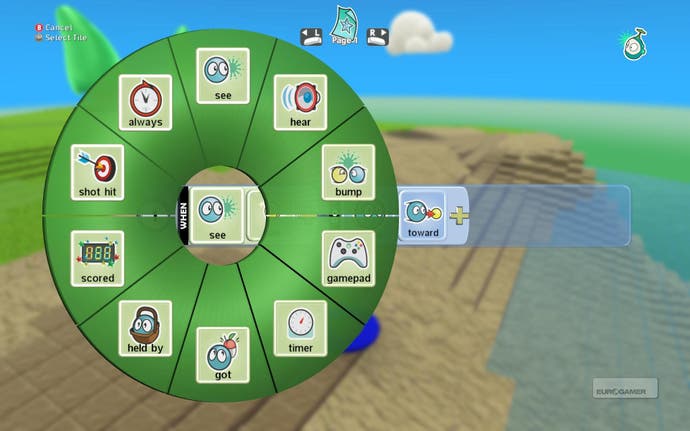Kodu Game Lab
One I made earlier.
In less than an hour I'd made my first game. Admittedly, it was a game in which you drive an unmanned unicycle around an abandoned piece of scrubland while attempting to shoot down a host of flying sharks with some multi-coloured lasers to a custom soundtrack of Sinatra's "Fly Me to the Moon". But crikey, if it wasn't just about the best unicycle-based, sea-predator-themed, crooner-soundtracked shoot-'em-up you've never played.
Videogame creator toolkits are far from a novelty. From the Commodore 64's Pinball Construction Set to the N64's Dezaemon 3D shoot-'em-up creation package (not to mention the multitude of level editors bundled in with just about every PC first-person shooter) game-building tools for consumers have been a niche but consistent feature of the gaming landscape. And, of course, the success of LittleBigPlanet's recent efforts to democratise game design, pressing the game's full creation toolset into players' hands, has popularised living room game-making like never before.
But Kodu Game Lab's ambitions outstrip those of its distant rivals, not to mention its paltry price point of 400 MSP. Here your creations are not bound to a single genre or set of game rules, or even a single visual style. Rather, this ostensibly-for-kids game-creation set has broadened its boundaries to encompass everything from third-person shooters to racing games to RPGs. While you're never going to be able to turn out the next Gears of War-alike with its modest XNA-based engine, you've a good chance of being able to approximate any ideas you may have, and the limits of what's possible are wide enough to allow your imagination a long leash.
That gently hyperbolic introduction out of the way, it's probably best to set some realistic expectations. Kodu Game Lab, while designed by Microsoft's employees, has enjoyed no special treatment in finding its way onto Xbox Live's indie game portal. Created in XNA and delivered to XNA, it has been subjected to all of the same restrictions as any enthusiast developer working for the platform.

If you are already a games programmer of even modest ability, you'll no doubt find this package restrictive, simplistic and a bit pointless. That's fine. Kodu Game Lab isn't for you. It's for us, the giant throng of gamers who feel like they might have the germ of a good idea for a game but don't have the time to learn C++ or LUA script in order to scale the massive learning curve that sits between our idea and our game. At the very least, it's for those of us who would like to understand just a little bit more about how videogames are put together, and on that basis, it's a triumph.
From first touch, Kodu Game Lab is teaching these principles. Sensibly, the game opens with a tutorial, rather than a blank sheet of 3D space. You're shown a pastoral scene containing a character standing on a pathway leading up to a tower atop a small hill. A speech bubble pops up with a challenge: "Program the character to automatically walk towards the character." And you're off. Clicking on the Kodu allows you to edit its behaviours in a string of accessible, well-presented commands.
These commands are generally split into a simple equation that reads: When 'X' then 'Y'. In this first tutorial that equates to: When 'character sees tower' then 'character walks towards tower'. Options are chosen from a smart, nested ring menu interface so that completing the first tutorial can take less than 30 seconds when you know what you're looking for. These command strings can grow to be far more complex, dictating both passive behaviours as well as active behaviours, and you can also stack the commands to make them more complex and specific.








